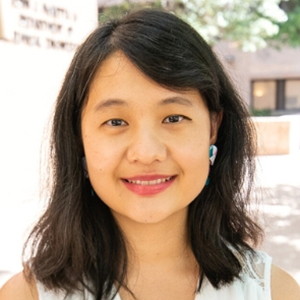Two-dimensional materials have recently been shown to demonstrate non-volatile resistive switching, offering significant advantages such as high-density integration and low energy consumption due to their atomic-scale thinness. Previous experimental work indicates that vertical heterojunctions based on transition metal dichalcogenides (TMDs) exhibit resistive switching and I-V hysteresis. Using first-principles calculations, we develop material-based relationships for resistive switching mechanisms based on the formation and dissolution defects and study the interfacial interactions that give rise to memory effects. Understanding the separate electronic, ionic, and coupled contributions in resistive switching mechanisms using first-principles methods is an overarching goal.

Wennie Wang,
University of Texas at Austin
In this presentation, I will describe our work in the computational characterization of defects in 2D materials in the monolayer and at the interface, understanding materials trends relating to switching energy, and elucidating the impact of an applied electric field on interfacial transport. Our results reveal that defect energetics of transition metals are connected to resistive switching processes and exhibit consistent materials trends across different TMDs (MoS2, MoSe2, WS2, WSe2). I will describe several models that explain this trend. Finally, I will discuss the effects of electric field in the hysteresis cycle and how structural asymmetry of the heterostructure and point defects impact the interfacial characteristics of the system on several I-V characteristics, such as the coercive voltage, remnant polarization and dissipation ratio.
Wennie Wang is a computational materials scientist and current assistant professor in the McKetta Department of Chemical Engineering at the University of Texas at Austin. She earned her B.S. degree in Materials Science and Engineering from the Massachusetts Institute of Technology in 2013, followed by her Ph.D. in Materials at the University of California, Santa Barbara in 2018 and a postdoctoral appointment at the University of Chicago in the Pritzker School of Molecular Engineering.
Her research focuses on the usage and deployment of first-principles computational methods for studying the optical and electronic properties of semiconductors, with a particular emphasis on defects in transition metal compounds. The Wang Materials Group combines electronic structure calculations and simulated spectroscopy, working closely with experimentalists in energy sustainability applications. Wennie serves as an early-career editorial board member for ACS Chem & Bio Engineering Journal and ACS Applied Electronic Materials, previously as chair of the APS Forum for Early Career Scientists (FECS), and is an APS Career Mentors Fellow.